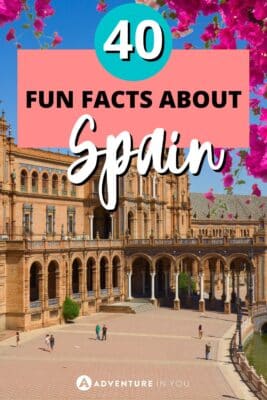Are you ready for some fun and interesting facts about Spain?
This country is full of surprises, from the world’s oldest restaurant to the epic tomato fight at the La Tomatina festival. And let’s remember Spain’s mouth-watering tapas, high-speed trains, and the Camino de Santiago pilgrimage route.
Whether you’re a history enthusiast, a foodie, or just love learning about new cultures, Spain has something for everyone.
So, grab a glass of sangria and get ready to be amazed by these fun facts about this fantastic country!
View Contents
- 1. Spain is Home to the World’s Oldest Restaurant
- 2. Spain is the Second Largest Country in the EU
- 3. Spain Has a Festival Where You Can Throw Tomatoes at Each Other
- 4. Spain is the World’s Largest Producer of Olive Oil
- 5. The Official Language of Spain is Called Castilian
- 6. Spain Boasts 48 UNESCO World Heritage Sites
- 7. Spain Has a Lot of Bars
- 8. Spain has 17 Autonomous Regions
- 9. The Famous Camino de Santiago
- 10. Spain Has One of the Longest Life Expectancies in the World
- 11. They Have the Longest High Speed Train Network
- 12. Spain Has More Than 8,000 KM of Coastline
- 13. Bullfighting Is a Controversial and Traditional Sport in Spain
- 14. Spain Has 226 Michelin Starred Restaurants
- 15. The Flamenco – A Traditional Spanish Dance
- 16. Spain Loves Football!
- 17. Spain is a Powerhouse for Artists
- 18. Spain Has 14 National Parks
- 19. The Spanish Have Naps Schedules Into Their Days
- 20. Antonio Gaudi is One of the Most Famous Architects in the World
- 21. Spain Produces the Well-Loved La Rioja Wines
- 22. The Spanish Royal Family is one of the Oldest in Europe
- 23. Spain is Home to the Oldest Working Lighthouse in the World
- 24. Spain Has More than 2,000 Castles!
- 25. Spain’s National Anthem Has No Lyrics
- 26. They Used Wind to Power their Electricity for a Year
- 27. Spain Has a Desert
- 28. Spain Has a Traditional Christmas Lottery
- 29. They Have a Really Good Tennis Player
- 30. A Traditional Spanish Dish – Paella
- 31. The Running of the Bulls Tradition
- 32. Spain is the Birthplace of the Guitar
- 33. Las Fallas in Valencia
- 34. It is Tradition to Eat Grapes on New Years
- 35. They Have an Island that is Part of Africa
- 36. They Invented Staplers
- 37. They Were Responsible for the Downfall of the Mexican Aztec Empire
- 38. The Sagrada Familia Church Has Taken 140 Years to Build (And Is Still Not Complete!)
- 39. Spain is Known for it’s Islands
- 40. They Have a Very Futuristic City
1. Spain is Home to the World’s Oldest Restaurant
Sobrino de Botín, located in the heart of Madrid, is recognized as the world’s oldest restaurant by the Guinness Book of World Records.
It has been in continuous operation since 1725, serving traditional Castilian cuisine to locals and tourists alike. The restaurant has been frequented by famous figures such as Ernest Hemingway, who mentioned it in his novel “The Sun Also Rises.”
Dishes like cochinillo asado (roast suckling pig) and Cordero Asado (roast lamb) are still cooked in the original wood-fired oven, which has been in use for more than 300 years.
✨The 1 Thing We Never Leave Home Without…✨

Coming from someone who has been traveling the world for the last 8 years AND has been in the hospital 2x, travel insurance is something everyone NEEDS to get. Get a quote below!
2. Spain is the Second Largest Country in the EU
After France, Spain is the largest country in the European Union. It boasts of diverse landscapes, climates, and cultures due to its vast area of 505,990 square kilometers.
3. Spain Has a Festival Where You Can Throw Tomatoes at Each Other
There are a lot of Spanish festivals but none compares to La Tomatina. La Tomatina is a festival held annually in the town of Buñol, near Valencia, Spain. It involves participants hurling ripe tomatoes at each other in a massive food fight.
The festival attracts thousands of visitors from all over the world and takes place on the last Wednesday of August each year.
The origins of the festival are unclear, but it is thought to have started in the 1940s or 1950s as a spontaneous food fight between young people.

Psst...Want in on a Secret? 🤫

We've scoured the internet for the best ALL-AROUND travel shoe and Tropicfeel wins by far. We've taken ours through rivers, jungles, and cities and they're still alive and kickin'. Check them out below.
4. Spain is the World’s Largest Producer of Olive Oil
Spain’s olive oil production accounts for over 40% of global production. Olive groves are found in many regions of Spain, with Andalusia being the largest producer.
Spain has a long history of producing high-quality olive oil, and it is a staple of the Mediterranean diet, which is considered one of the healthiest diets in the world.
Spanish olive oil is known for its rich and fruity flavor, and it is used in many traditional Spanish dishes.
5. The Official Language of Spain is Called Castilian
Castilian or Spanish if the official language in Spain. However, they also have different dialects like Catalan, Basque, and Galician which are also widely spoken.
6. Spain Boasts 48 UNESCO World Heritage Sites
Spain is home to an impressive 48 UNESCO World Heritage Sites, including both cultural and natural landmarks.
These sites showcase the country’s rich history and diverse landscapes, from the Alhambra Palace in Granada to the historic center of Toledo. Other notable sites include the Park Guell in Barcelona, the Santiago de Compostela pilgrimage route, and the Teide National Park in the Canary Islands.
With so many breathtaking sites to explore, Spain is truly a treasure trove of cultural and natural wonders.
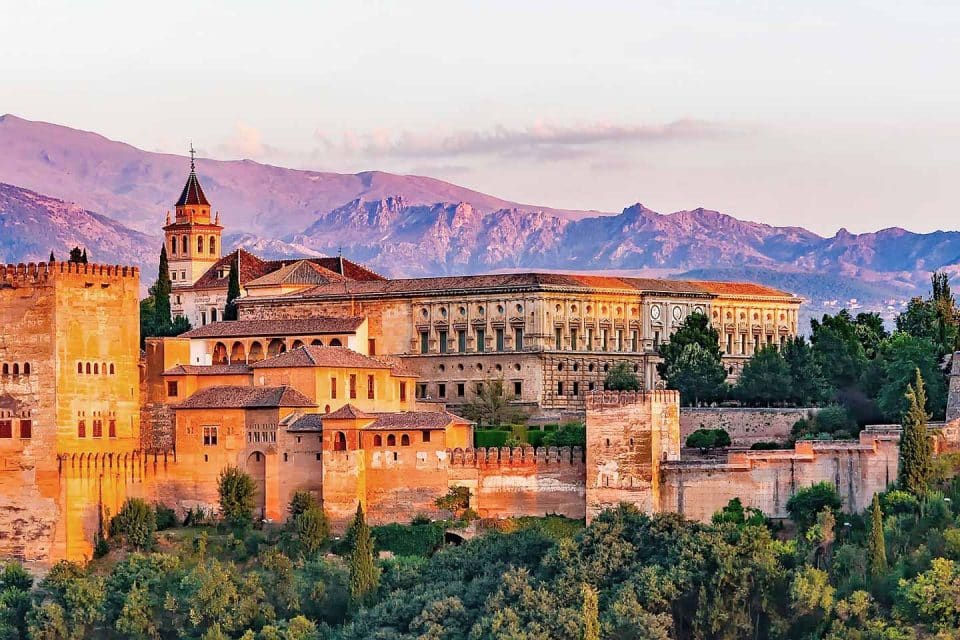
7. Spain Has a Lot of Bars
Spain is famous for its vibrant and social culture, and this is reflected in the country’s huge number of bars. Spain has the second-highest number of bars per capita in the world, after Cyprus.
Bars are popular meeting places for friends and family, and they often serve delicious tapas and other tasty snacks alongside drinks. For example, the Catalan capital of Barcelona has lots of amazing cocktail bars!
8. Spain has 17 Autonomous Regions
Spain consists of 17 autonomous regions, each with unique cultural and historical backgrounds. These regions possess varying degrees of self-governance, allowing them to preserve and promote their distinctive identities, languages, and traditions.
For example, Barcelona is part of Catalonia and Catalan is the main dialect that locals like to use.
9. The Famous Camino de Santiago
Hiking in Spain is very popular but none is as famous as The Camino de Santiago, also known as the Way of Saint James. This hiking trail is a famous pilgrimage route that ends at the cathedral of Santiago de Compostela in Galicia, Spain.
The route has been traveled by pilgrims for more than 1,000 years and has become a popular destination for people from all over the world. The most popular route, the Camino Francés, covers about 800 km and takes about a month to complete.
Along the way, pilgrims can enjoy stunning scenery, beautiful architecture, and a deep sense of history and spirituality.
Founders of this blog recently completed the Camino de Portugues which is a pilgrimage from Portugal to Spain.

10. Spain Has One of the Longest Life Expectancies in the World
With an average life expectancy of over 83 years, Spain has one of the longest life expectancies in the world.
This is due in part to the country’s healthy Mediterranean diet, which is rich in fresh fruits, vegetables, and olive oil. The country’s healthcare system is also highly regarded, providing universal coverage and access to high-quality medical care.
Additionally, Spain’s culture of socializing and spending time with family and friends is thought to contribute to its citizens’ overall health and well-being.
Enjoying these Facts? Check out our other facts about other countries
11. They Have the Longest High Speed Train Network
Spain has the longest high speed train network in all of Europe. This train network is called AVE and connects major cities at speeds up to 310 km/h. They have over 3,100km of train tracks, making train travel very convenient.
12. Spain Has More Than 8,000 KM of Coastline
Spain is a country that is surrounded by water on three sides, with over 8,000 km of coastline along the Mediterranean Sea, the Atlantic Ocean, and the Bay of Biscay.
The beaches of Spain are frequented by tons of people around the world and it’s easy to see why. From the white sand beaches of Malaga and Costa del Sol to the rugged cliffs of the Costa Brava, there is something for every beach lover in Spain.
The country’s coastal regions are also famous for their fresh seafood and picturesque fishing villages.
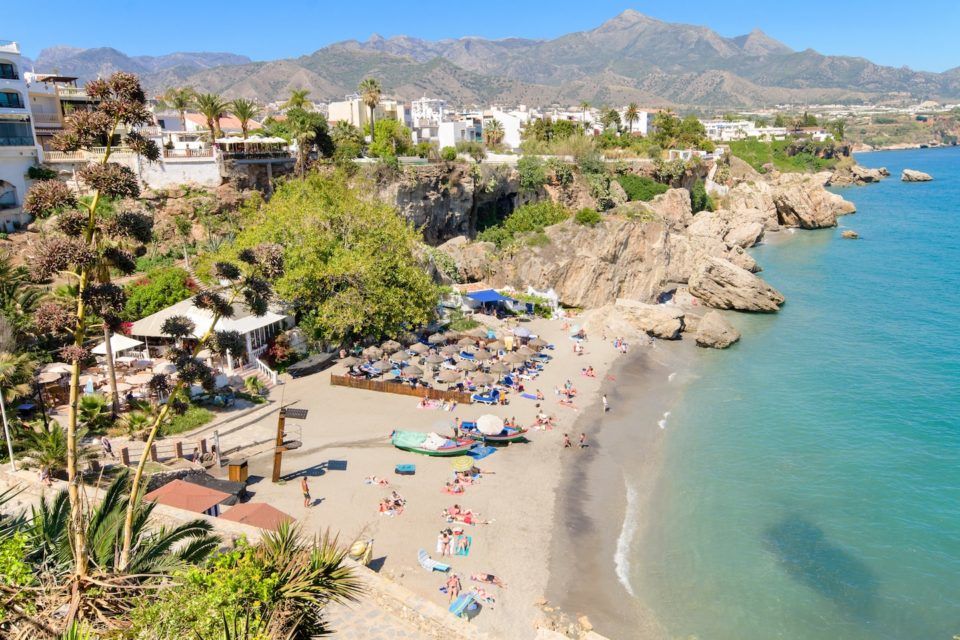
13. Bullfighting Is a Controversial and Traditional Sport in Spain
Bullfighting, also known as Tauromachia, is a controversial tradition in Spain that has been a part of the country’s cultural heritage for centuries.
The practice involves a matador, or bullfighter, facing off against a bull in an arena. While bullfighting is still legal in many parts of Spain, it has faced increasing criticism and opposition in recent years due to concerns about animal welfare.
Despite this, the spectacle continues to be popular with some Spaniards and tourists, and it remains an important part of the country’s cultural identity.
14. Spain Has 226 Michelin Starred Restaurants
Spanish food is incredible and it shows in their cuisine. In fact, they have a whopping 226 Michelin starred restaurants spread all over the country.
15. The Flamenco – A Traditional Spanish Dance
Flamenco is a traditional dance and musical style that originated in Andalusia, Spain. It is characterized by passionate movements, expressive hand gestures, and intricate footwork.
Flamenco is often performed at festivals and celebrations throughout Spain and has become a beloved art form around the world.
The dance is often accompanied by live music, including guitar, singing, and percussion instruments, and it has become an important part of Spanish cultural identity.
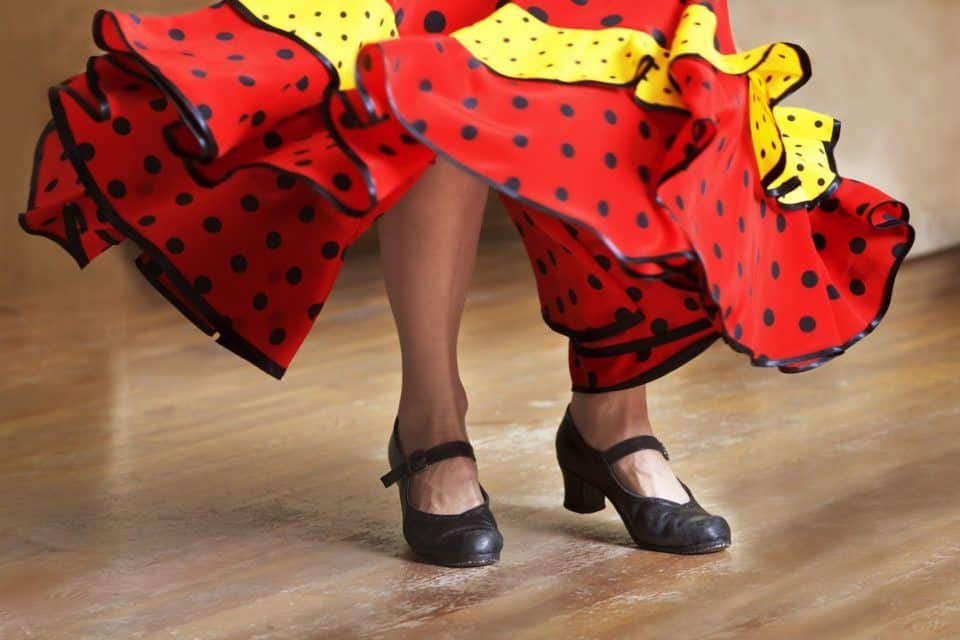
16. Spain Loves Football!
Soccer, or football, is the most popular sport in Spain, and it is deeply ingrained in the country’s culture.
The two biggest clubs in Spain, Real Madrid, and Barcelona, have a fierce rivalry that extends far beyond the soccer field. Games between the two teams, known as El Clásico, are among the most-watched sporting events in the world.
Spanish soccer has produced some of the greatest players in history, including Lionel Messi, Andres Iniesta, and Iker Casillas, and the national team has won numerous international tournaments, including the World Cup and the European Championships.
Looking for other fun facts? Check out a few of our guides:
17. Spain is a Powerhouse for Artists
Spain is home to several famous artists, including Pablo Picasso, Salvador Dalí, Joan Miro, Antonio Gaudi, and Francisco Goya.
18. Spain Has 14 National Parks
Spain is home to 14 National Parks, which protect some of the country’s most beautiful and ecologically important landscapes.
These parks cover more than 3% of Spain’s total land area and include diverse ecosystems such as wetlands, forests, mountains, and coastal regions. Visitors to Spain’s National Parks can enjoy a wide range of outdoor activities, from hiking and camping to birdwatching and wildlife spotting.
Some of the most popular National Parks in Spain include Doñana, Ordesa y Monte Perdido, and Teide.
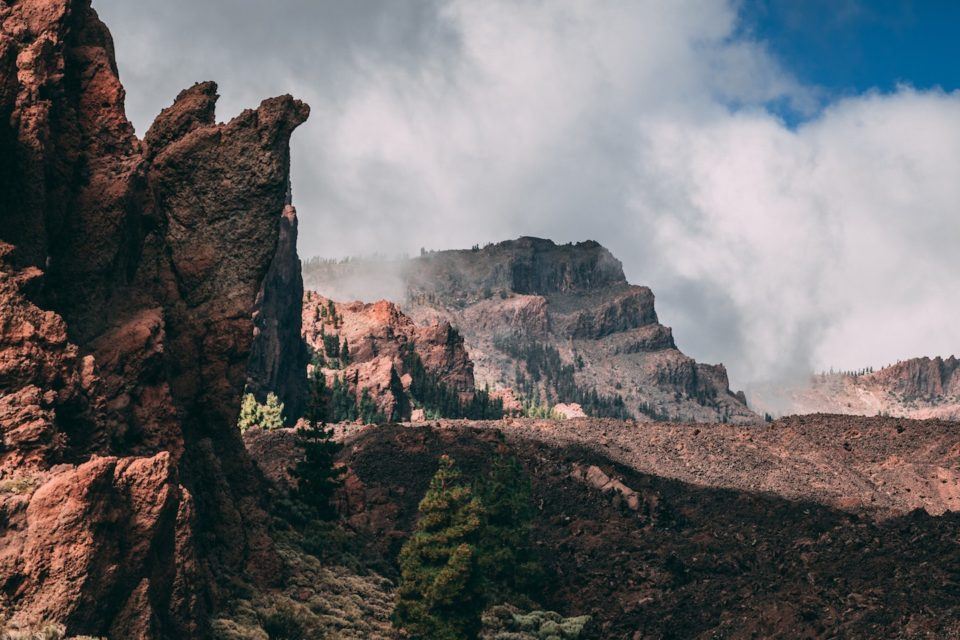
19. The Spanish Have Naps Schedules Into Their Days
Naps or siesta is a long-standing tradition in Spain that involves taking a midday nap, typically after lunch (probably my favorite thing about Spanish culture!)
The siesta is thought to have originated as a way to avoid working during the hottest part of the day, and it remains an important part of Spanish culture today. Many businesses still close for a few hours in the afternoon to allow employees to take a siesta.
While the siesta has faced criticism in recent years due to its impact on productivity, it remains a beloved tradition in Spain.
20. Antonio Gaudi is One of the Most Famous Architects in the World
Antoni Gaudí, a renowned architect, is famous for his unique buildings in Barcelona, such as La Sagrada Familia and Park Güell.
His work is recognizable all over the world and has made Barcelona one of the most famous places to visit in Spain due to this crazy designs.
21. Spain Produces the Well-Loved La Rioja Wines
La Rioja is a wine region in northern Spain that is famous for its high-quality red wines, which are made primarily from the Tempranillo grape.
La Rioja wines are known for their complex flavors and aromas, with notes of dark fruit, spice, and notes of oak. The region has a long history of winemaking, dating back to Roman times, and it is home to some of the most well-known wineries in Spain.
La Rioja wines are widely exported and are enjoyed by wine lovers around the world.
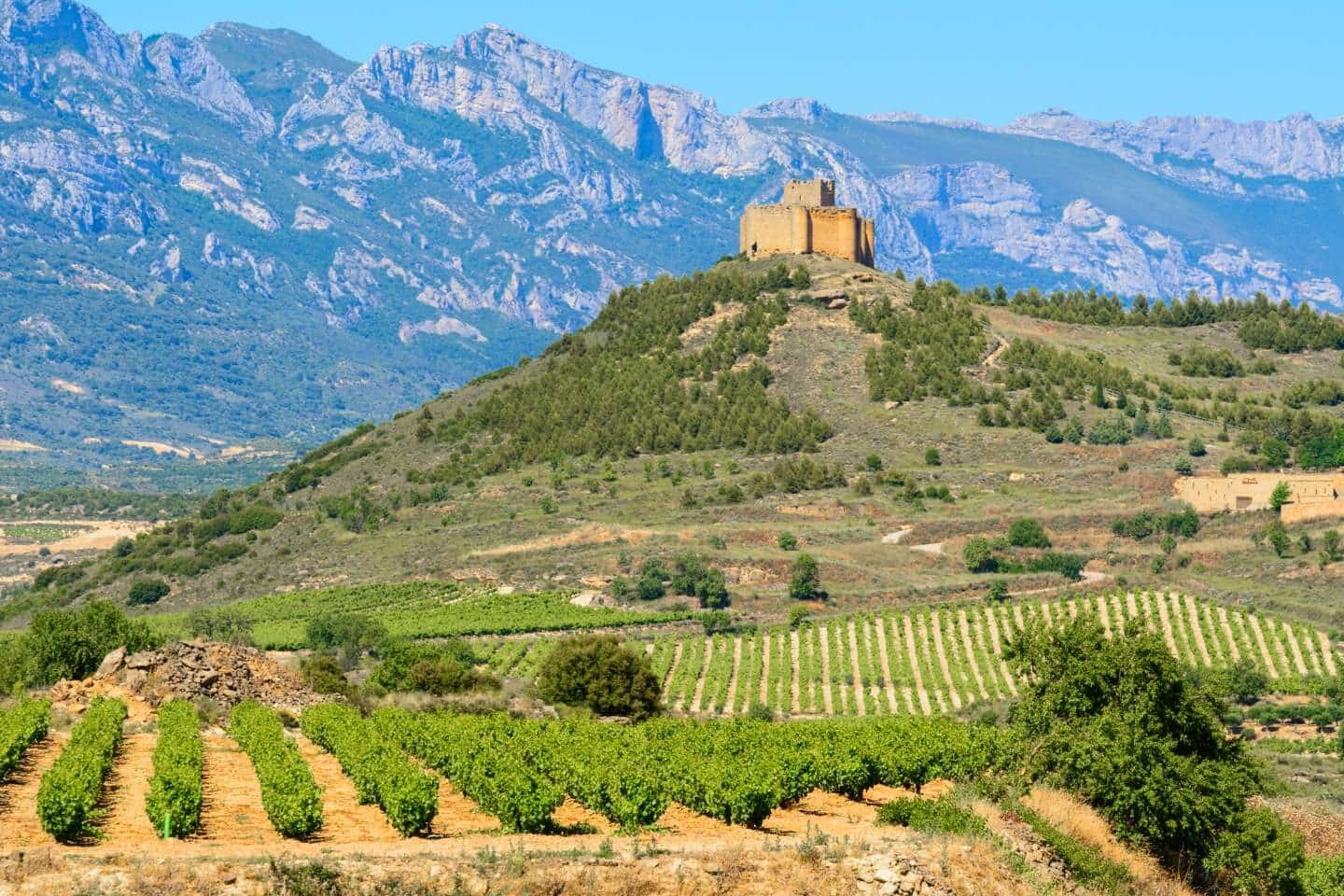
22. The Spanish Royal Family is one of the Oldest in Europe
The Spanish Royal Family, also known as the House of Bourbon, is one of the oldest royal families in Europe, with a history dating back to the 15th century.
The current King of Spain, Felipe VI, ascended to the throne in 2014, following the abdication of his father, King Juan Carlos I.
The Spanish Royal Family is widely respected and admired by many people in Spain, and their public appearances are often greeted with great enthusiasm and respect.
23. Spain is Home to the Oldest Working Lighthouse in the World
Spain has the oldest existing lighthouse in the world, the Tower of Hercules, built by the Romans in the 2nd century AD.
24. Spain Has More than 2,000 Castles!
Spain is known for its rich history and cultural heritage, and this is reflected in the country’s impressive collection of over 2,000 castles.
Many of these castles date back to the Middle Ages and were built to defend against invaders. Today, they serve as popular tourist attractions, and many have been converted into museums, hotels, or event spaces.
Some of the most famous castles in Spain include the Alcázar of Segovia, the Castle of Coca, and the Castle of Loarre.
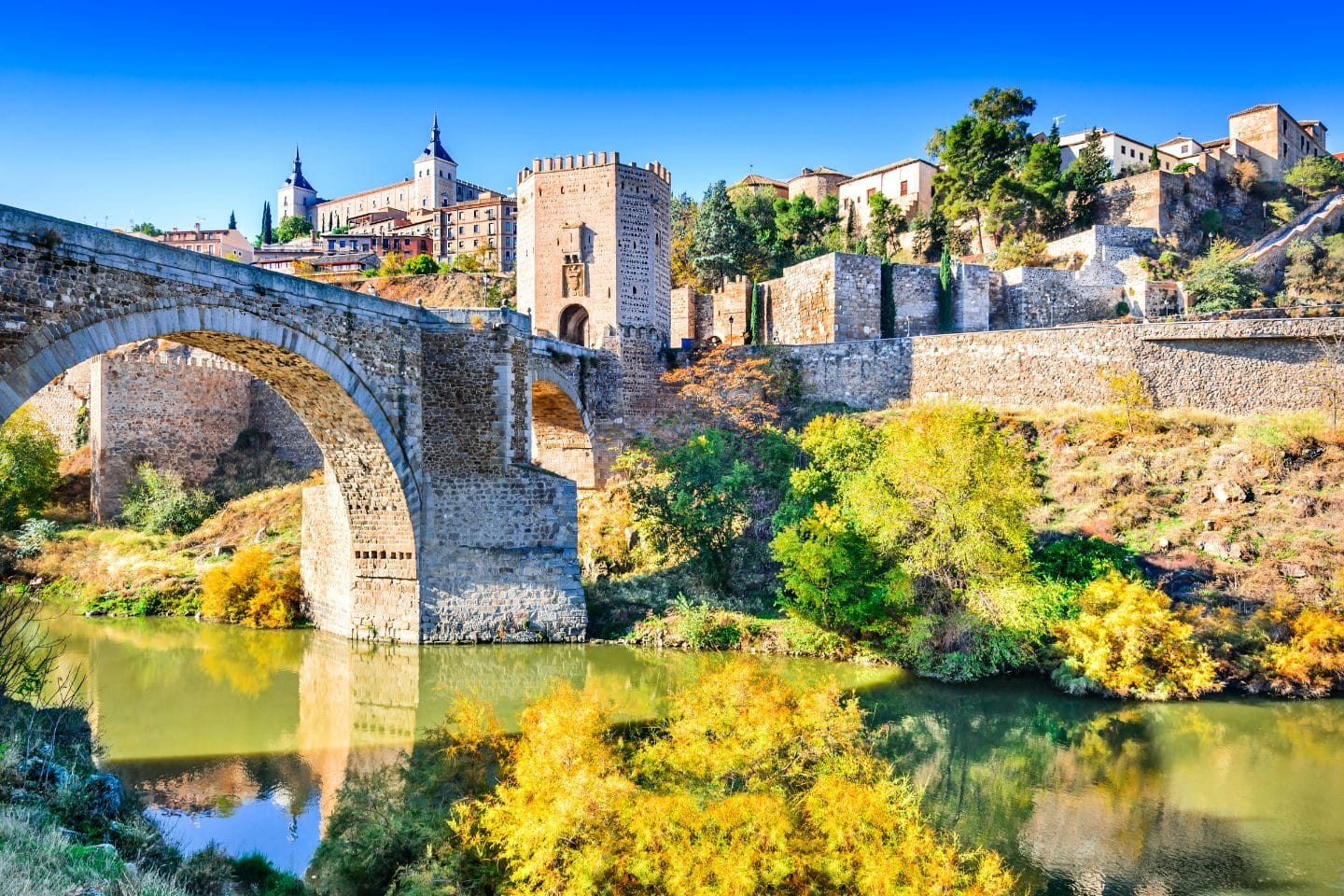
25. Spain’s National Anthem Has No Lyrics
The Spanish national anthem, known as La Marcha Real, does not have any official lyrics. The melody is thought to have originated in the 18th century and has been used as the national anthem since 1770.
Despite its long history, the anthem has been a subject of controversy in Spain, with some calling for it to be replaced with a new anthem that reflects the country’s modern values and identity.
The lack of official lyrics for La Marcha Real has allowed it to remain a symbol of national unity and identity, while also allowing for a certain degree of flexibility and interpretation.
26. They Used Wind to Power their Electricity for a Year
In 2013, they became the first country in the world where wind energy was the main source of electricity generation for a whole year. This has since fueled other countries to start looking into alternative sources of energy.
27. Spain Has a Desert
Spain is home to the only desert in Europe, known as the Tabernas Desert. Located in the province of Almería, the desert covers an area of about 280 square kilometers and is characterized by its rugged, rocky terrain and sparse vegetation.
The desert has been used as a filming location for many Western films, earning it the nickname “The Hollywood of Europe.” Despite its arid climate, the Tabernas Desert is home to a surprising variety of wildlife, including reptiles, birds, and mammals.
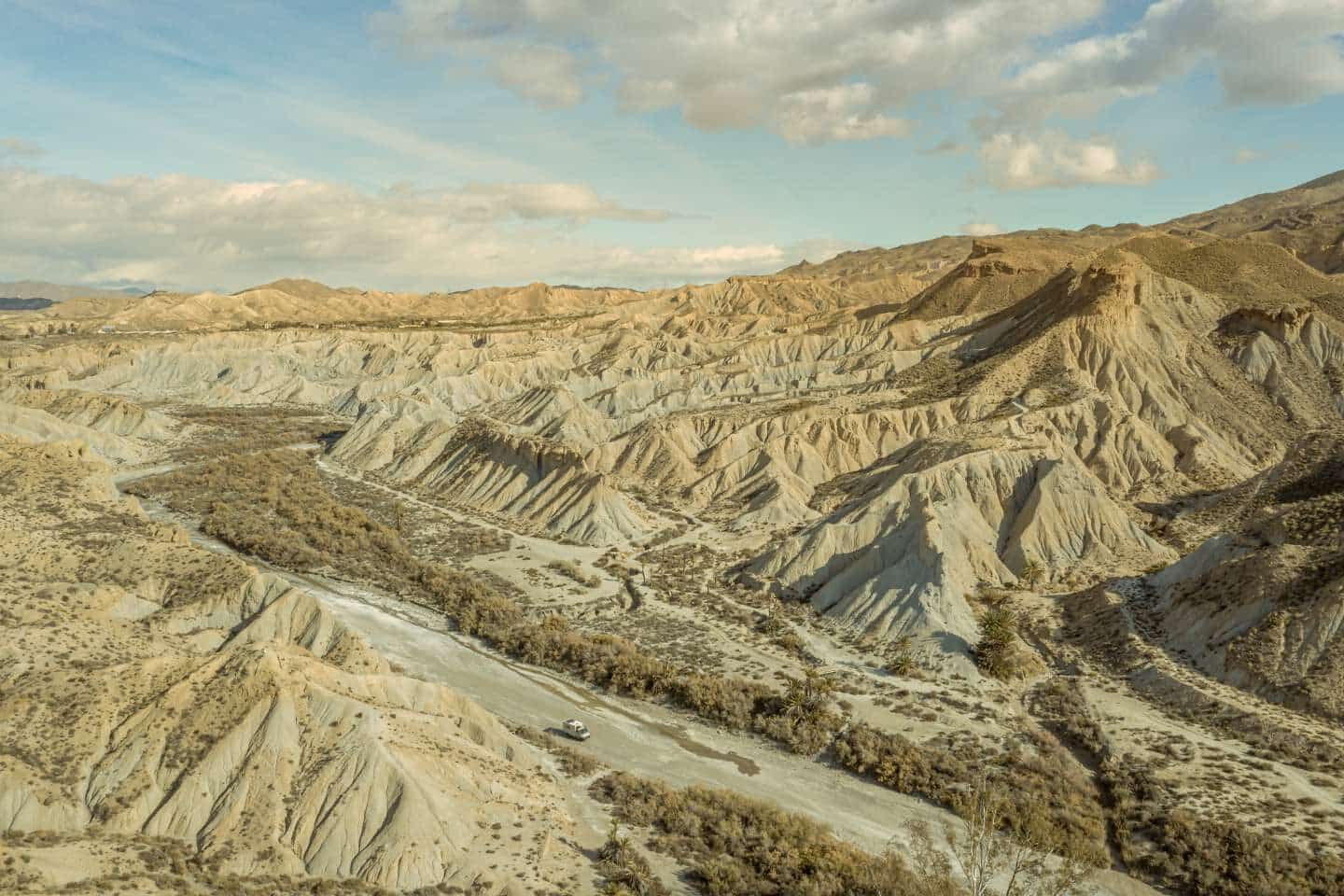
28. Spain Has a Traditional Christmas Lottery
The Spanish Christmas lottery, known as El Gordo, is the world’s largest lottery, with a prize pool of more than €2 billion.
The lottery has been held every year since 1812 and is a beloved tradition in Spain. The drawing takes place on December 22nd, and winning numbers are sung by schoolchildren in a live broadcast that is watched by millions of people.
The lottery is known for its unique system of sharing wealth, with many smaller prizes in addition to the top prize, which is often shared among many winners.
29. They Have a Really Good Tennis Player
Spanish tennis player Rafael Nadal has won 22 Grand Slam singles titles. This includes a record of 14 French Open titles, 92 ATP singles titles, and 36 Masters titles.
30. A Traditional Spanish Dish – Paella
Paella is a traditional rice dish that originated in Valencia, Spain in the mid-19th century. The dish is named after the pan it is cooked in, which is called a paellera.
Originally, paella was a peasant dish made with rice, vegetables, and whatever meat was available, often rabbit or chicken.
Today, paella is a beloved and iconic dish in Spain, with many different variations that include seafood, sausage, or mixed meats.
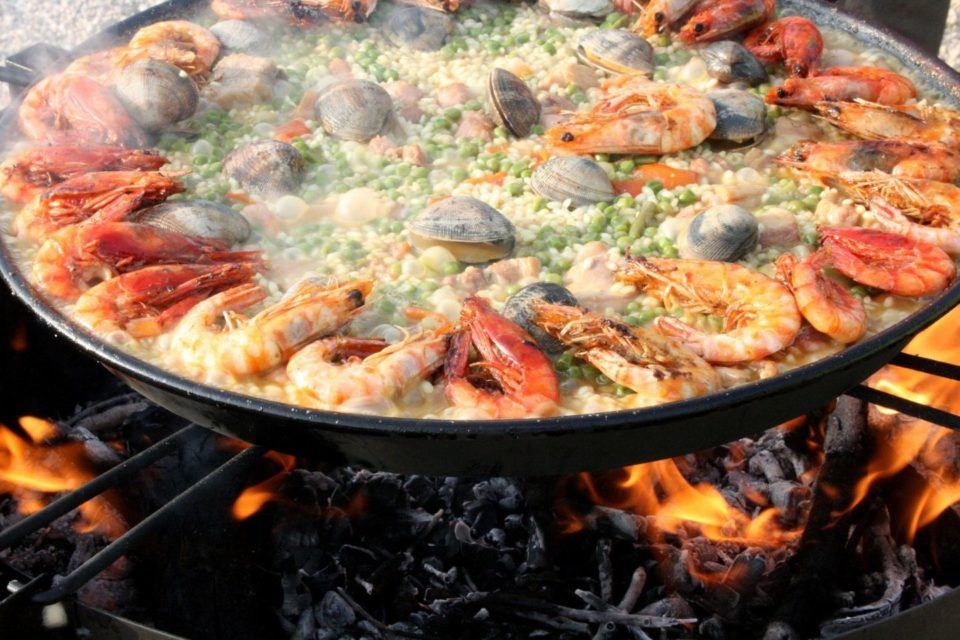
31. The Running of the Bulls Tradition
The Running of the Bulls, or Encierro, is a traditional event held annually in Pamplona, Spain, as part of the San Fermín festival. It involves participants running ahead of a group of bulls that are let loose on the streets of the city.
The event is both dangerous and controversial, with many animal welfare groups condemning the use of bulls for entertainment. However, the event remains popular with some locals and tourists, who see it as a test of courage and a celebration of tradition.
32. Spain is the Birthplace of the Guitar
Spain is the birthplace of the guitar, with the modern classical guitar originating in the early 1500’s.
Its beginnings can be linked to the Spanish vihuela, a popular stringed instrument in the 16th and 17th centuries. The vihuela was kind of like the modern classical guitar in shape, but it had a deeper body and fewer strings.
33. Las Fallas in Valencia
Las Fallas is an annual festival held in Valencia, Spain, that celebrates the arrival of spring. The festival is known for its elaborate and colorful sculptures, called fallas, that are made from paper-mâché and other materials.
The sculptures are often satirical or humorous and are displayed throughout the city before being burned in a massive bonfire on the last night of the festival. Las Fallas also includes fireworks displays, parades, and other cultural events, and it attracts thousands of visitors from all over the world.
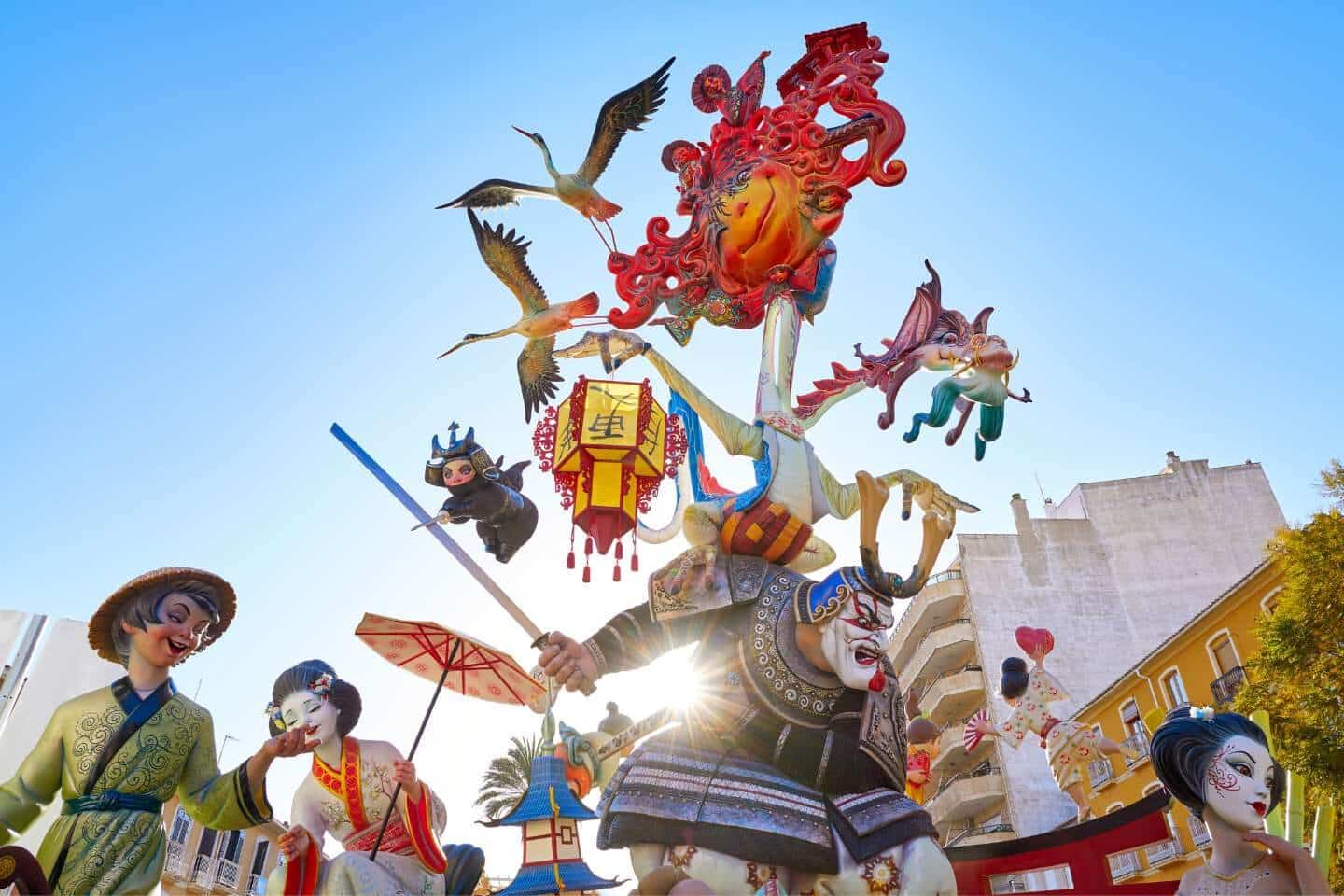
34. It is Tradition to Eat Grapes on New Years
The Spanish custom of eating 12 grapes at midnight on New Year’s Eve is believed to bring good luck for the coming year.
They usually eat this during their Noche Buena or midnight feast.
35. They Have an Island that is Part of Africa
The Canary Islands, a Spanish archipelago, are geographically part of Africa but politically part of Spain.
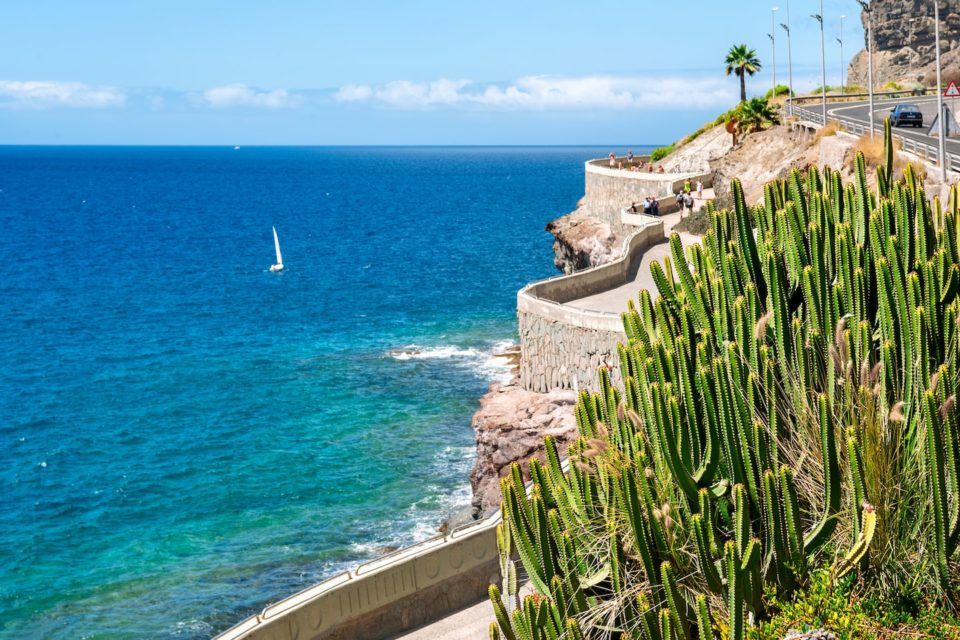
36. They Invented Staplers
The first known stapler was invented in the 18th century in the Basque Country as a gift to the French King Louis XV. However, it wasn’t until 1866 when a patent was filed for the invention that it became mainstream.
37. They Were Responsible for the Downfall of the Mexican Aztec Empire
Spanish explorer and conquistador Hernán Cortés led the expedition that caused the fall of the Aztec Empire in the early 16th century.
38. The Sagrada Familia Church Has Taken 140 Years to Build (And Is Still Not Complete!)
Construction of this iconic basilica in Barcelona began in 1882, and it’s still not completed.
When finished, it will have taken longer to build than the Great Pyramids of Giza in Egypt. Interestingly, Antoni Gaudí, the architect behind the project, once said, “My client is not in a hurry,” referring to the idea that the church was being built for God, who had all the time in the world.
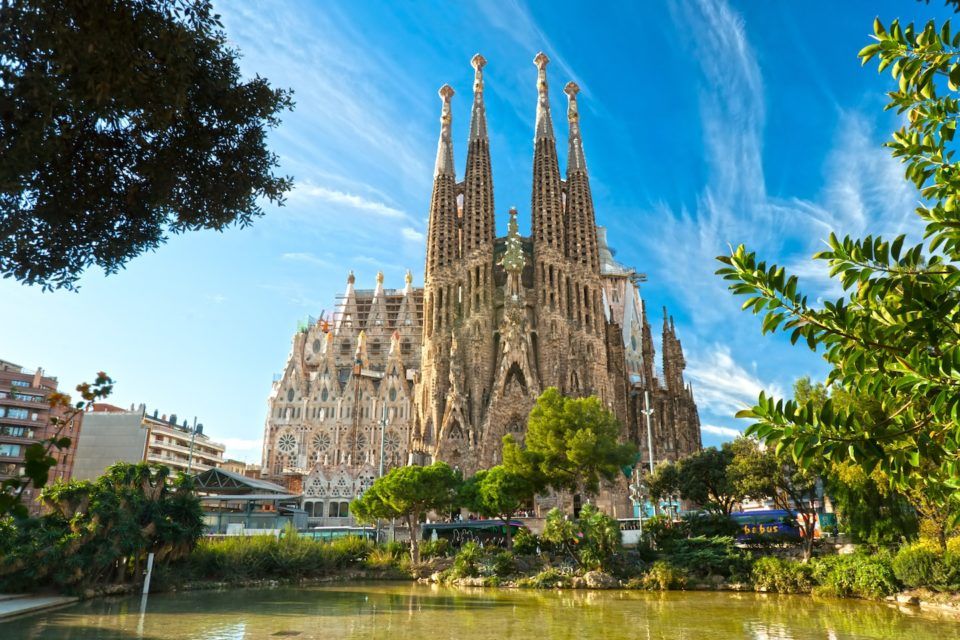
39. Spain is Known for it’s Islands
Spain has two main groups of islands: the Balearic Islands and the Canary Islands. The Balearic Islands are located in the Mediterranean Sea, while the Canary Islands are situated in the Atlantic Ocean, off the northwest coast of Africa.
The Balearic Islands consist of 4 main islands: Mallorca, Menorca, Ibiza, and Formentera, along with numerous smaller islets.
The Canary Islands are an archipelago of 7 main islands: Tenerife, Gran Canaria, Lanzarote, Fuerteventura, La Palma, La Gomera, and El Hierro, as well as several smaller islands and islets.
In total, Spain has 11 main islands and numerous smaller islands and islets, amounting to well over 60 individual landmasses when counting the smaller ones.
40. They Have a Very Futuristic City
Valencia is a Spanish city with a rich historical background, is also known for its futuristic vibe, thanks to the City of Arts and Sciences.
This striking architectural complex, designed by renowned architect Santiago Calatrava, looks like it’s straight out of a sci-fi movie. The complex consists of several ultramodern buildings, including an opera house, a planetarium, and an interactive science museum, all surrounded by a vast, stunningly designed outdoor space.

Hopefully you’ve enjoyed these facts about Spain.
Fun facts aside, Spain is an amazing country with a whole lot to offer. This place has everything from stunning landscapes and cool architecture to delicious food and epic parties.
It’s the perfect blend of old-world charm and modern vibes. Spain is definitely a hotspot for anyone looking to have a great time, learn something new, or simply soak up its unique atmosphere.
So, whether you’re into history, art, music, or just some good ol’ tasty treats, Spain’s got your back. Trust me, when you dig into everything this fantastic nation has to offer, you’ll be swept away by its charm in no time.
Read these posts for more Spain travel inspiration:
Inspired? Pin it!
